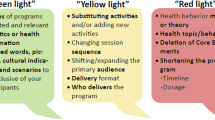Abstract
Cancer-related disparities are the significant differences in cancer incidence, cancer prevalence, cancer death, cancer survivorship, and burden of cancer or related health conditions that exist disproportionately in certain populations compared with the general population with respect to variables like race, ethnicity, and geography. The emergence of comprehensive cancer control efforts provides a framework to address the unequal disease burden felt by these groups. This article illustrates four distinct programs uniquely designed to fit at-risk populations. Specific examples are given that demonstrate a significant impact on the full range of the cancer care continuum. Although measureable progress has been made to improve prevention, detection, and treatment of cancer throughout the United States, many populations remain underserved, impeding our ability to achieve national healthcare goals. Here, we reemphasize the need to sustain this progress through use of partnerships, technology, and policy.
Similar content being viewed by others
References
Methods for measuring cancer disparities: a review using data relevant to healthy people 2010 cancer-related objectives. Available from http://seer.cancer.gov/publications/disparities/. Accessed 18 Sept 2010
Hayes N, Rollins R, Weinberg A, Brawley O, Baquet C, Kaur JS, Palafox NA (2005) Cancer-related disparities: weathering the perfect storm through comprehensive cancer control approaches. Cancer Causes Control 16:41–50
Espey DK, Wu XC, Swan J, Wiggins C, Jim MA, Ward E, Wingo PA, Howe HL, Ries LA, Miller BA, Jemal A, Ahmed F, Cobb N, Kaur JS, Edwards BK (2007) Annual report to the nation on the status of cancer, 1975–2004, featuring cancer in American Indians and Alaska Natives. Cancer 110:2119–2152
Edwards BK, Ward E, Kohler BA, Eheman C, Zauber AG, Anderson RN, Jemal A, Schymura MJ, Lansdorp-Vogelaar I, Seeff LC, van Ballegooijen M, Goede L, Ries LAG (2010) Annual report to the nation on the status of cancer, 1975–2006, featuring colorectal cancer trends and impact of interventions (risk factors, screening, and treatment) to reduce future rates. Cancer 116: 544–573. Online version: annual report to the nation on the status of cancer, 1975–2006, featuring trends in colorectal cancer. Available from: http://seer.cancer.gov/report_to_nation/index.html. Accessed 18 Sept 2010
Chu KC, Miller BA, Springfield SA (2007) Measures of racial/ethnic health disparities in cancer mortality rates and the influence of socioeconomic status. J Natl Med Assoc 99:1092–1104
Social determinants of health. Available from: http://www.who.int/social_determinants/en/. Accessed 27 Aug 2010
Steele CB, Cardinez CJ, Richardson LC, Tom-Orme L, Shaw KM (2008) Surveillance for health behaviors of American Indians and Alaska Natives-findings from the behavioral risk factor surveillance system, 2000–2006. Cancer 113:1131–1141
The Cherokee Nation comprehensive cancer control plan. Available from: http://cancer.cherokee.org/. Accessed 10 July 2010
American Indian/Alaska Native comprehensive cancer control policy and practice summit June 30, 2009. Available from: http://www.c-changetogether.org/pubs/pubs/AI-AN%20Policy%20and%20Practice%20Summit%20Summary-FINAL%20-%202009.pdf. Accessed 15 July 2010
The comprehensive cancer control movement 10 years of success 1998–2008. Available from: https://www.cancerplan.org/portal/server.pt/gateway/PTARGS_0_2_28368_822_4206402_43/http%3B/publishedcontent.societylink.org/publishedcontent/publish/_cancerplan/cp_resources/ccc_10_year_history_article.html. Accessed 18 June 2010
Alaska Native Tribal Health Consortium. Available from: http://www.anthc.org/chs/crs/cancer/index.cfm. Accessed 16 July 2010
The Alaska comprehensive cancer control plan 2005–2010. Available from: http://www.hss.state.ak.us/publications/alaskaComprehensiveCancerControlPlan.pdf. Accessed 10 July 2010
The comprehensive cancer control plan for the Commonwealth of the Northern Mariana Islands 2007–2012. Available from: http://ccamarianas.org/pdf/cccplan.pdfm. Accessed 15 July 2010
Commonwealth Cancer Association (CCA) to maintain services, hope for survivors. Saipan Tribune Monday, February 15, 2010. Available from: http://www.saipantribune.com/newsstory.aspx?newsID=97221&cat=1. Accessed 16 July 2010
Puerto Rico comprehensive cancer control plan, 2008–2012. San Juan (PR): comprehensive cancer control coalition; 2008
First ever Native American men’s health summit held. The Voice, a newsletter published by the Intercultural Cancer Council, July 2009. Available from: http://www.iccnetwork.org/news/ICCtheVoice200907.pdf. Accessed 27 Aug 2010
National Partnership for Action to End Disparities. Available from: http://minorityhealth.hhs.gov/npa/. Accessed 30 Aug 2010
Acknowledgments
The authors wish to acknowledge Grant H13/CC625012-05 for Reverse Capacity Building: Sharing our Cultural Story American Indian/Alaskan Native Educational Forum and Cooperative Agreement Number MPCMP051006-03 for the EDICT-CLAS Project. We also wish to thank Anne P. Lanier, MD, MPH, Guillermo Tortolero-Luna, MD, PhD, Nayda Figuero-Valle, MD, MPH, and Rachel Morris BA.
Author information
Authors and Affiliations
Corresponding author
Rights and permissions
About this article
Cite this article
Weinberg, A.D., Jackson, P.M., DeCourtney, C.A. et al. Progress in addressing disparities through comprehensive cancer control. Cancer Causes Control 21, 2015–2021 (2010). https://doi.org/10.1007/s10552-010-9649-8
Received:
Accepted:
Published:
Issue Date:
DOI: https://doi.org/10.1007/s10552-010-9649-8




